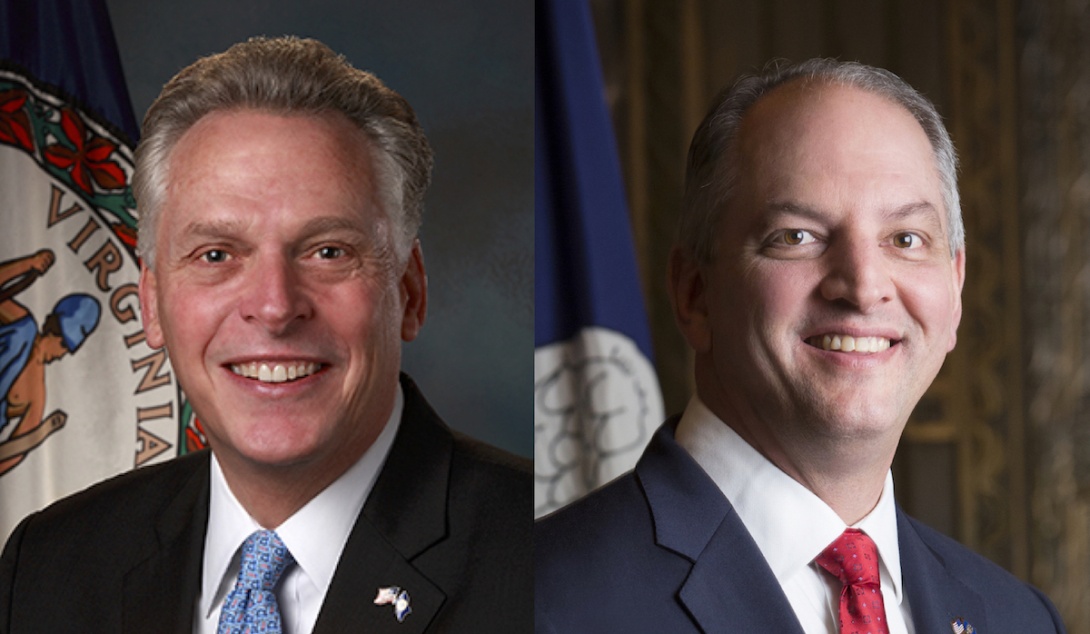In a South dominated by conservatives, progressives rack up policy wins

Eight Southern states have seen progressive change in 2016, including Virginia, where Democrat Terry McAuliffe (left) is governor, and Louisiana, where Democrat John Bel Edwards (right) is chief executive.
Despite a barrage of conservative legislation from Republican-dominated state governments across the South in 2016, there is good news for progressives in eight Southern states where elected officials took steps to expand access to voting and health care and improve job prospects for ex-offenders.
This week the State Innovation Exchange (SiX), a nonprofit created as a progressive response to the conservative American Legislative Exchange Council (ALEC), released its annual "End of Session Report." It details numerous legislative wins on issues near and dear to conservatives, such as tax cuts for the wealthy, ballot access restrictions, and limits on abortion and LGBT rights. These policies did particularly well in the South,* where only one legislative chamber (the Kentucky House) has a Democratic majority, and only three states (Louisiana, Virginia and West Virginia) have Democratic governors.
But as SiX documents, some Southern states still embraced policies promoted by progressives:
* Florida. In March, the Florida legislature approved two laws expanding health care access: HB 5101 eliminated a five-year waiting period for children of undocumented immigrants to access care through Medicaid or the Children's Health Insurance Program, while HB 221 allows health care customers to avoid out-of-network charges in certain circumstances.
* Georgia. In April, Georgia Gov. Nathan Deal (R) signed into a law a measure that improves health care access by requiring health insurers to keep their provider directories accurate and up-to-date and requiring financial compensation for consumers who receive a surprise out-of-network medical bill because of an inaccuracy in the provider directory.
* Louisiana. Last month Louisiana Gov. John Bel Edwards (D) signed a "ban-the-box" law passed by the legislature barring state employers from asking people seeking unclassified jobs about prior convictions on their initial application. In April, Edwards issued an executive order protecting state workers and contractors from being fired, discriminated against or harassed because of sexual orientation or gender identity. And in January, on his second day in office, Edwards signed an executive order making Louisiana the 31st state to expand Medicaid, a move that will provide health care coverage to an estimated 375,000 people.
* Virginia. In March, the legislature passed SB 291, providing sexual assault victims with anonymous physical evidence recovery kits that will be stored for at least two years and will be routed to law enforcement if the victim decides to report the assault. And an executive order from Gov. Terry McAuliffe (D) in April restored voting rights to more than 200,000 ex-felons.
In addition, four Southern states took steps to make voter registration easier: West Virginia became the third U.S. state after California and Oregon to enact automatic voter registration with the passage of HB 4013. Also this year, Tennessee, Alabama and Kentucky all created online voter registration systems.
SiX Executive Director Nick Rathod told Facing South that he expects to see more progressive achievements in the states next year, as he believes progressives will take seats from conservatives in this fall's election nationwide, including in Southern states.
* Facing South considers these 13 states as part of the South: Alabama, Arkansas, Florida, Georgia, Kentucky, Louisiana, Mississippi, North Carolina, South Carolina, Tennessee, Texas, Virginia and West Virginia.
Tags
Alex Kotch
Alex is an investigative journalist based in Brooklyn, New York, and a reporter for the money-in-politics website Sludge. He was on staff at the Institute for Southern Studies from 2014 to 2016. Additional stories of Alex's have appeared in the International Business Times, The Nation and Vice.com.
